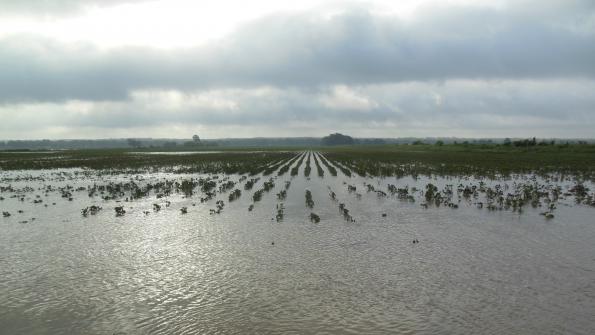
With yet another round of mid-July rains headed towards the Delta, Bob Scott says there are some options producers might consider.
“Right now, there are a lot of flooded acres that farmers are looking to replant,” says the Arkansas weed specialist. “There are also a lot of wheat beans being planted.
“When you get this late in the year, late June/early July, you start running into plant-back interval problems. Some of the residual herbicides like Flexstar and Dual are essential to fighting pigweed in Roundup Ready crops.”
Unfortunately, for a number of reasons, there is still reluctance among some growers to switch to LibertyLink technology. However, says Scott, “it really does have a much better fit in situations where we get to the point where we can’t, or shouldn’t, use products like Flexstar and Dual which could potentially carryover to next year’s crop.”
Some of that reluctance is tied to the cost of the LibertyLink system. “In some areas, growers have said it’s worth the cost and they’re heavily utilizing the technology.
“Another thing is Monsanto still has a big pull and influence on many folks’ decision making. That’s true from the grower to the seed salesman to the chemical salesman. Monsanto has done a great job, by the way, with their rewards program where growers are paid to use residuals. That has been tremendously successful.”
The LibertyLink technology has now been available for a number of years. “The bottom line is we probably wouldn’t be growing cotton if it weren’t for Phytogen and LibertyLink varieties. Those enable farmers to deal with pigweeds because they’re tolerant to Liberty. Unfortunately, we just don’t have the tools to control pigweed any longer in Roundup Ready cotton.
“Another aspect of this is many of our LibertyLink soybeans are being planted on the absolute worst pigweed fields that growers have. If they aren’t using a residual in those fields, if they aren’t making an early application of Liberty, then this one technology is kind of being abused. That’s all we have left that��’s very effective on pigweed with no crop rotation issues.”
Coming tech
There is much talk about the new technologies that are coming -- dicamba soybeans, 2,4-D soybeans, HPPD/Balance soybeans (which will be covered in depth at the upcoming Pigposium tour at the Northeast Research and Extension Center in Keiser, Ark., on July 23).
That’s great, says Scott, “but we’re not utilizing an already approved technology, LibertyLink, as much as we should be in some scenarios.
“We really need to ask ourselves: when these new technologies arrive are we going to treat them like we have LibertyLink? If it kills pigweed, are we going to potentially use dicamba and Roundup and nothing else? That’s a bad possibility -- we’d end up selecting for resistant grasses like we did before pigweed got so ugly. This is a discussion we need to have.”
Scott points out this isn’t just an issue in the Delta. “There’s now resistant pigweed all the way up into Michigan. Growers are facing this wherever resistant pigweed, or waterhemp, has become a problem. In fact, because of the necessity of Phytogen and LibertyLink for growing cotton, the adoption of the technology has been much more widespread here than in, say, the Midwest.”
Regardless, “as Delta growers go to replant they really should consider LibertyLink beans. It just makes sense to rotate chemistries. Yet, I keep getting calls on Roundup Ready beans.”
What about drift concerns with the new technologies?
“The biggest concern I have is with dicamba on a non-dicamba soybean. Soybeans are just as sensitive to dicamba as cotton is to 2,4-D, if not worse.
“In the past, when we’ve had a new technology come online -- say when Roundup Ready corn was introduced in the South -- there was a tremendous problem with Roundup drift on corn. That problem has really never been solved. The solution, if you want to call it that, was that all the corn grown became Roundup Ready.
“My concern with dicamba soybeans, once introduced, is the potential for injury on anything that is off-target. I have a feeling that could potentially drive everyone to begin growing dicamba soybeans out of self-preservation.
“From a resistance management standpoint that would be awful. That situation would just kill diversity.”
About the Author(s)
You May Also Like




